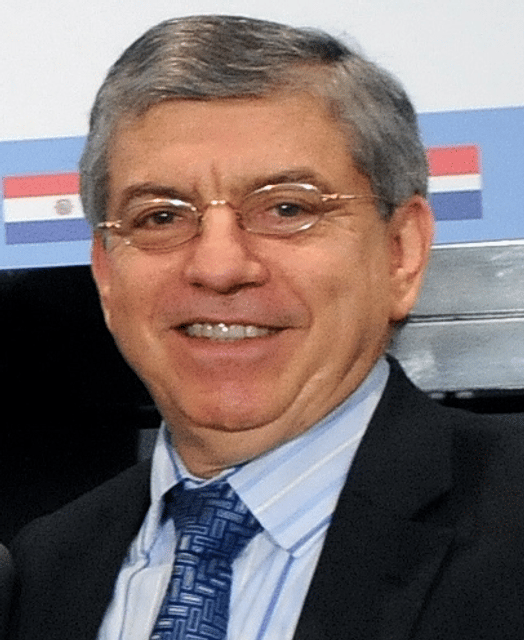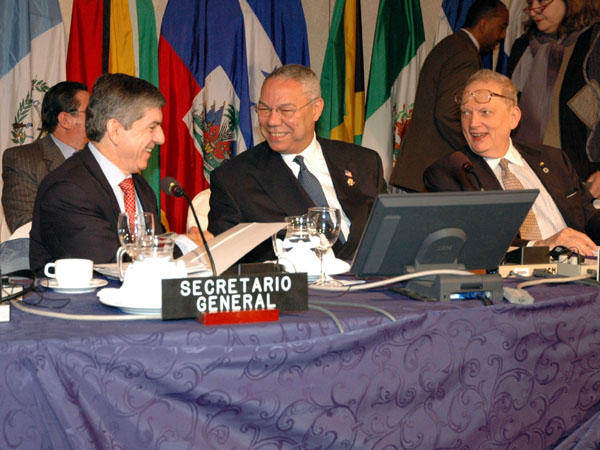César Gaviria

César Gaviria

César Gaviria | |
|---|---|
| 7th Secretary General of the Organization of American States | |
| In office September 15, 1994 (1994-09-15) – September 15, 2004 (2004-09-15) | |
| Preceded by | João Clemente Baena Soares |
| Succeeded by | Miguel Ángel Rodríguez |
| 28th President of Colombia | |
| In office August 7, 1990 (1990-08-07) – August 7, 1994 (1994-08-07) | |
| Preceded by | Virgilio Barco Vargas |
| Succeeded by | Ernesto Samper Pizano |
| Minister of Interior and Justice | |
| In office May 1987 – February 1989 | |
| President | Virgilio Barco Vargas |
| Preceded by | Fernando Cepeda Ulloa |
| Succeeded by | Raúl Orejuela Bueno |
| 57th Minister of Finance and Public Credit of Colombia | |
| In office August 7, 1986 (1986-08-07) – June 17, 1987 (1987-06-17) | |
| President | Virgilio Barco Vargas |
| Preceded by | Hugo Palacios Mejía |
| Succeeded by | Luis Fernando Alarcón Mantilla |
| Member of the Chamber of Representatives of Colombia | |
| In office July 20, 1974 (1974-07-20) – July 20, 1986 (1986-07-20) | |
| Constituency | Risaralda Department |
| President of the Chamber of Representatives of Colombia | |
| In office July 20, 1984 (1984-07-20) – July 20, 1985 (1985-07-20) | |
| Preceded by | Hernando Gómez Otálora |
| Succeeded by | Daniel Mazuera Gómez |
| Personal details | |
| Born | César Augusto Gaviria Trujillo (1947-03-31)March 31, 1947 Pereira, Risaralda, Colombia |
| Nationality | Colombian |
| Political party | Liberal |
| Children |
|
| Alma mater | University of the Andes(BEcon, 1969) |
| Occupation | Economist |
César Augusto Gaviria Trujillo (Spanish: [ˈsesaɾ auˈɣusto ɣaˈβiɾja tɾuˈxiʝo] ; born March 31, 1947) is a Colombian economist and politician who served as the President of Colombia from 1990 to 1994, Secretary General of the Organization of American States from 1994 to 2004 and National Director of the Colombian Liberal Party from 2005 to 2009. During his tenure as president, he summoned the Constituent Assembly of Colombia that enacted the Constitution of 1991.
César Gaviria | |
|---|---|
| 7th Secretary General of the Organization of American States | |
| In office September 15, 1994 (1994-09-15) – September 15, 2004 (2004-09-15) | |
| Preceded by | João Clemente Baena Soares |
| Succeeded by | Miguel Ángel Rodríguez |
| 28th President of Colombia | |
| In office August 7, 1990 (1990-08-07) – August 7, 1994 (1994-08-07) | |
| Preceded by | Virgilio Barco Vargas |
| Succeeded by | Ernesto Samper Pizano |
| Minister of Interior and Justice | |
| In office May 1987 – February 1989 | |
| President | Virgilio Barco Vargas |
| Preceded by | Fernando Cepeda Ulloa |
| Succeeded by | Raúl Orejuela Bueno |
| 57th Minister of Finance and Public Credit of Colombia | |
| In office August 7, 1986 (1986-08-07) – June 17, 1987 (1987-06-17) | |
| President | Virgilio Barco Vargas |
| Preceded by | Hugo Palacios Mejía |
| Succeeded by | Luis Fernando Alarcón Mantilla |
| Member of the Chamber of Representatives of Colombia | |
| In office July 20, 1974 (1974-07-20) – July 20, 1986 (1986-07-20) | |
| Constituency | Risaralda Department |
| President of the Chamber of Representatives of Colombia | |
| In office July 20, 1984 (1984-07-20) – July 20, 1985 (1985-07-20) | |
| Preceded by | Hernando Gómez Otálora |
| Succeeded by | Daniel Mazuera Gómez |
| Personal details | |
| Born | César Augusto Gaviria Trujillo (1947-03-31)March 31, 1947 Pereira, Risaralda, Colombia |
| Nationality | Colombian |
| Political party | Liberal |
| Children |
|
| Alma mater | University of the Andes(BEcon, 1969) |
| Occupation | Economist |
Biography
Early life
Born in Pereira, the Gaviria family had been an important figure in Colombian politics and economy for over 30 years. César Gaviria is the distant cousin of José Narces Gaviria,the CEO of Bancolombia from 1988–1997. José N. Gaviria encouraged César Gaviria to run for the Congress of Colombia in early childhood. He was first elected to Congress in 1974. He served in Virgilio Barco's government, first as Minister of Finance and later as the Minister of the Interior.[1]
As a student, Gaviria spent a year as an exchange student in the United States with AFS Intercultural Programs.
Before entering politics, he studied at the University of the Andes in the 1960s. He established AIESEC there, and then in 1968 was elected President of AIESEC in Colombia. This began his public service career.
At 23, he was elected councilman in his hometown of Pereira, and four years later he became the city's mayor. In 1974 he was elected to the Chamber of Representatives, of which he was president of in 1984–85. Three years later he became co-chair of the Colombian Liberal Party.
He was the debate chief of Luis Carlos Galán, during Galan's 1989 presidential campaign, which was cut short by Galan's assassination. After this tragedy, Gaviria was proclaimed as Galan's political successor. This campaign was the target of attacks by Pablo Escobar; Gaviria was to take Avianca Flight 203, bound for Cali. For security reasons he did not board the flight. The plane, with 107 people aboard, exploded, killing everyone on board.[2]
Presidency
In 1990, he was elected President of Colombia, running as a Liberal Party candidate. During his government a new constitution was adopted in 1991.[3] As president, Gaviria also led the fight against the Cali drug cartel, and various guerrilla factions.
Under his presidency, the prison La Catedral was built, but to Pablo Escobar's specifications. When Escobar was imprisoned there, he continued to control his drug empire; he also murdered several of his rivals inside the prison. On 20 July 1992, Escobar escaped after learning that he was going to be moved to a different prison. On 2 December 1993, the notorious drug lord was shot dead, a triumph for the Gaviria administration.
Despite stable economic growth, foreign investment, and the Colombian State's ability to regularly pay interest on its debt, 45 per cent of Colombians live below the poverty line (particularly in rural areas) and slums are growing around major cities. . Created by drug traffickers and supported by the army (President Gaviria says he sees them as a "possible solution"), paramilitary groups, sometimes called "self-defence" by some media, are responsible for fighting the guerrillas. In cities, these groups carry out social cleaning missions against "unproductive" and "waste". Tramps, marginalized people, street children and homosexuals are murdered by these groups. Corruption is on the rise: many judges, several senators, priests, and even the head of the national police have been convinced of links with traffickers.[4]
Secretary General of the OAS

César Gaviria heading the OAS session (left) and then US Secretary of State, Colin Powell.
In 1994, Gaviria was elected Secretary General of the OAS (his term beginning after the end of his presidential term in August 1994). Reelected in 1999, he worked extensively on behalf of Latin America. Between October 2002 and May 2003, he served as international facilitator of the OAS mesa process, aimed at finding a solution to the internal Venezuelan political crisis between President Hugo Chávez and the Coordinadora Democrática opposition.[5]
Adviser and scholar
After leaving the OAS, Gaviria worked briefly in New York as an advisor and scholar at Columbia University. Upon his return to Colombia, he founded an art gallery named Nueveochenta, and has remained in the country ever since.
Personal Life
Although he led a straight life, and has two children from his marriage to Ana Milena Muñoz, Gaviria's sexual orientation was a matter of popular speculation for many years. He openly declared himself a homosexual in 2014. [6]
Current
Gaviria was proclaimed the sole chief of the Colombian Liberal Party in June 2005. On 27 April 2006, his sister Liliana Gaviria was killed by unknown gunmen.[7]
| Colombia's four failed peace talks[1] [12] | ||
|---|---|---|
| Year | President | Ended because |
| 1982–1985 | Belisario Betancur | Most Supreme Court Justices were killed when M-19 commandos and the Army fought for control of the building |
| 1986–1990 | Virgilio Barco Vargas | FARC ambush killed 26 soldiers in Caquetá |
| 1990–1992 | César Gaviria Trujillo | FARC attack on the Senate President. FARC kidnapping and killing of an ex-cabinet member. |
| 1998–2002 | Andrés Pastrana Arango | FARC kidnapping of Senator |